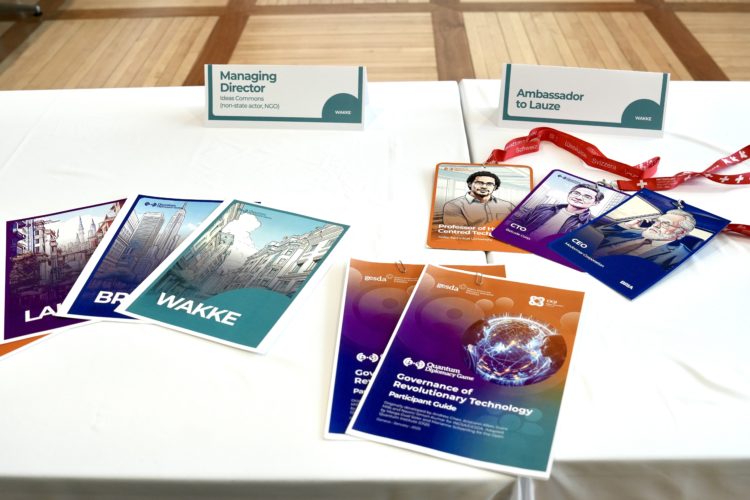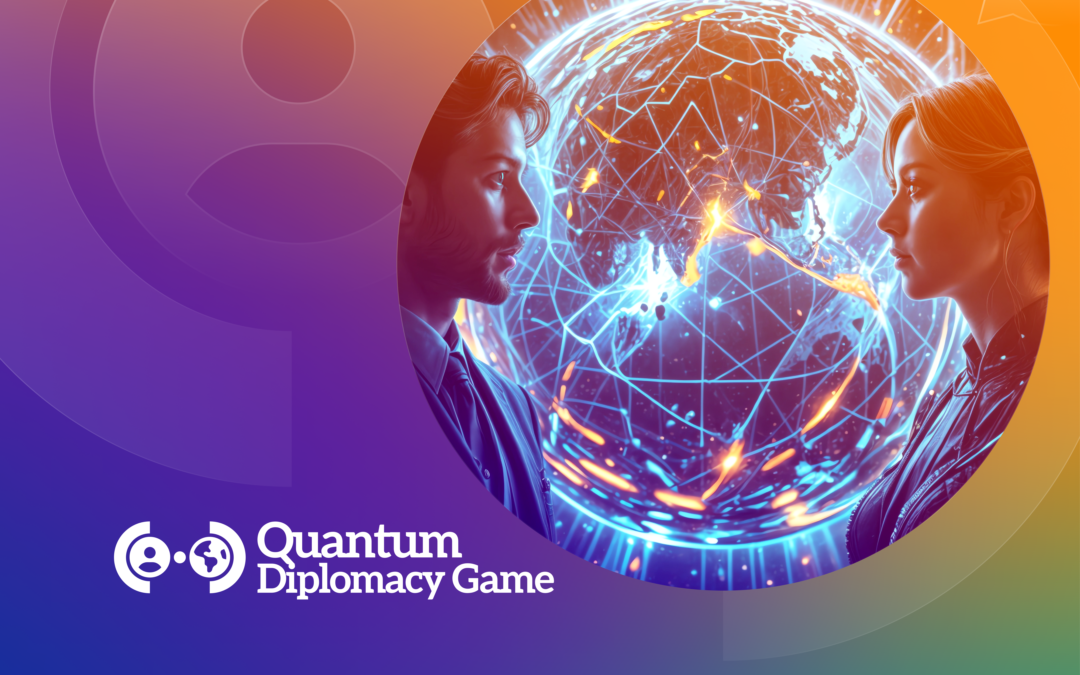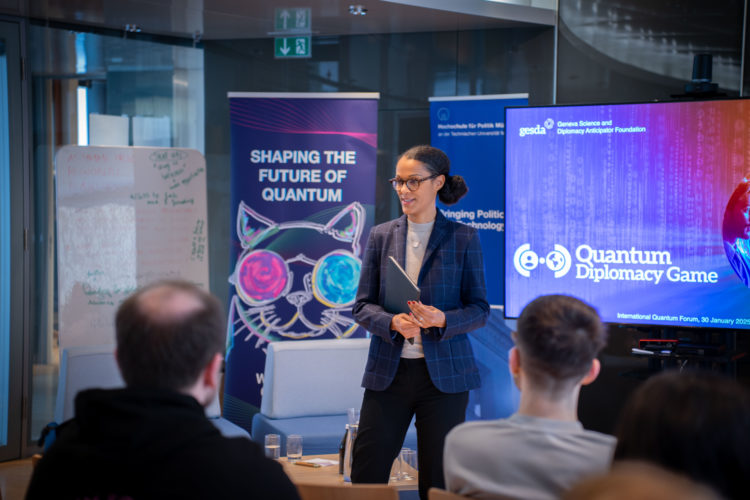Imagine if we had a way of seeing the future of science and technology? With it we could understand and act earlier to prepare for situations like what happened with artificial intelligence – a surge of applications almost no one anticipated or knew how to govern.
It’s a serious card game — and so much more — that introduces leaders to anticipatory science diplomacy, a way of preparing for the future of science and technology.
The new Quantum Diplomacy Game, developed by GESDA for the Open Quantum Institute (OQI) hosted at CERN in Geneva, represents something entirely new: an initiative to train future leaders in essential skills such as anticipation and negotiation to proactively govern and deploy emerging technologies like quantum computing while involving all stakeholders.
The game demonstrates how important it is for anticipation to be used in science diplomacy when leaders are involved in setting rules, regulations, standards, soft laws and other governance frameworks for new technologies.
Anticipatory science diplomacy is a proactive approach that equips leaders with the tools to govern frontier science, ensuring that scientific advances benefit humanity and accelerate progress toward global goals.
The importance of anticipation in science diplomacy can be measured not only through its usefulness in devising governance frameworks for frontier science, but also in showing the costs of not anticipating scientific advances. Three of its core elements — science anticipation, honest brokering, then global and multilateral action — are essential in training leaders to gain the capacity to confront global challenges and transform them into opportunities.

The three pillars of anticipatory science diplomacy
The first is science anticipation, which involves practicing ways that leaders can harness the benefits of cutting-edge research while keeping any of the potential ethical, social and environmental implications within full view.
The second is honest brokering, which involves the ability to facilitate discussions among a range of stakeholders and build up trust, manage diverse viewpoints, and translate discoveries into real-world applications.
The third is global and multilateral action, since no single nation can tackle global challenges alone. Leaders will need to broker treaties, negotiate resource-sharing agreements, and design frameworks to ensure quantum breakthroughs are accessible, equitable across borders, and support SDGs.
Marga Gual Soler, GESDA’s Head of Science Diplomacy Capacity Building
First example of anticipatory science diplomacy in action
Launched this week on the occasion of the opening of the United Nations’ 2025 International Year of Quantum Science and Technology (IYQ) at UNESCO headquarters in Paris, the game will be used at OQI and IYQ events worldwide as a teaching tool for governments and stakeholders to promote responsible innovation, equitable access, and science diplomacy for the UN’s Sustainable Development Goals, a globally approved blueprint for peace and prosperity.
“The Open Quantum Institute is the first example of an anticipatory science diplomacy initiative in action,” says Marga Gual Soler, GESDA’s Head of Science Diplomacy Capacity Building. “The Quantum Diplomacy Game draws from the process, methodology and lessons of building a framework for the governance and deployment of a technology that is not yet here. Using this window of anticipation, we challenge participants to imagine proactive rather than reactive approaches that include all stakeholders and harness the transformative opportunities of quantum computing.”
This immersive game offers a powerful learning experience — one that mirrors geopolitical tensions and conflicts. “By putting themselves in the shoes of CEOs, ministers, ambassadors, professors or civil society leaders in a fictional scenario, players experience the conflicting agendas, motivations and mindsets driving each players’ positions and decisions, encouraging perspective-shifting and mutual understanding,” Gual Soler says.
Marianne Schörling, a GESDA Senior Program Manager responsible for capacity building at the OQI
Translating advances into real-world applications
The game cultivates essential skills like anticipation, negotiation, and diplomatic protocol, while also providing a deeper understanding of the societal and geopolitical impact of emerging technologies. Participants explore critical issues such as access, intellectual property, peace and security, international trade, ethics, and capacity building. While addressing serious topics, the game is also designed to be engaging and enjoyable.
“How can we translate scientific advances into real-world applications for society and manage diverse viewpoints? How can we harness the potential of quantum technology responsibly and inclusively?” asks Marianne Schörling, a GESDA Senior Program Manager responsible for capacity building at the OQI.
“The Quantum Diplomacy Game, a serious card game developed by the GESDA Foundation for the Open Quantum Institute, offers a unique learning opportunity to experience first-hand possible solutions to these questions,” she says. “The players go from immersing themselves in a fictional quantum breakthrough scenario to one of a quantum crisis — and enter into a global and multilateral dialogue. Interdisciplinary debates will deepen their understanding of quantum technology’s potential and multilateral efforts.”

The new card game in use at the Embassy of Switzerland in the U.S. at Washington (Swiss FDFA)
The roots of anticipation
The game is getting a broader launch after having been tested and refined since 2022 by GESDA and the International Network for Governmental Scientific Advice (INGSA) at the Geneva Science Diplomacy Week.
GESDA adds the emphasis of anticipation, which, the GESDA Science Breakthrough Radar® notes, comes from a Greek word that means to seize beforehand.
“From its earliest use, therefore, anticipation has combined a forward-looking attitude with the potential for deliberate action, with consideration of possible futures used as a key factor in deciding which actions to take in the present,” the 2024 Radar says of GESDA’s approach to anticipation. “Through this ability to combine action and purposeful anticipation, we are freed to see aspects of our future as being malleable to creative forces and novelty — as long as suitable enabling conditions exist.”
So far it has been played at the UNODA Disarmament Fellowship, the Embassy of Switzerland in the United States, CERN during the launch of the OQI, the 2024 conference in Kigali, Rwanda, and the International Quantum Forum at TUM in Munich, representing participants from over 80 countries.

The Embassy of Switzerland in the U.S. at Washington prepares to use the new card game. (Swiss FDFA)
Working toward global goals
Included in the game is a set of instructions that help put into practice the concept of anticipatory science diplomacy. A high-level discussion that GESDA co-hosted with the American Association for the Advancement of Science (AAAS), The Royal Society and the European Union at the INGSA conference in Kigali examined the need to evolve both the concept and framework of science diplomacy in the current geopolitical landscape.
“While multilateral efforts and governance today remain nascent, the Quantum Diplomacy Game is a first step to prepare for the potential large- scale availability of quantum computing,” Schörling says.
“The game demonstrates why the Open Quantum Institute was created,” she says, “highlighting that a multilateral and multistakeholder approach involving governments, industry, and academia is essential for promoting responsible innovation, ensuring equitable access, and activating quantum diplomacy for the SDGs.”
https://www.youtube.com/watch?v=vZsbE7A8ItE&list=PLx_MQeZFozYy2b6UP9SpudRjrUWNZ70fW


